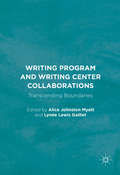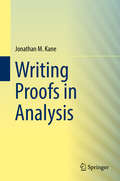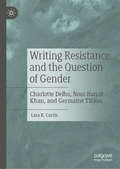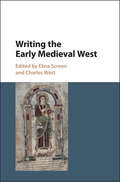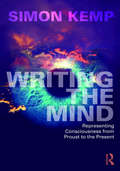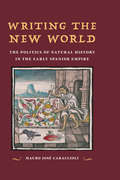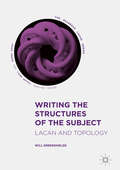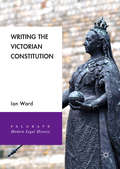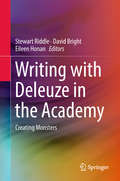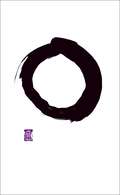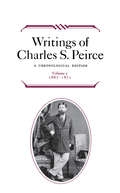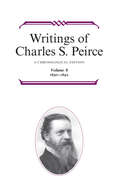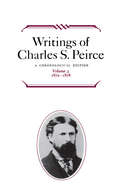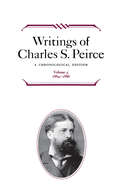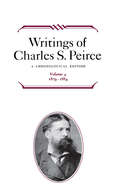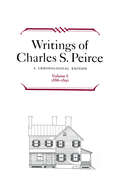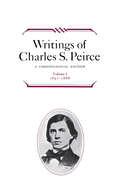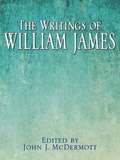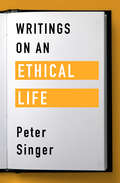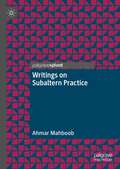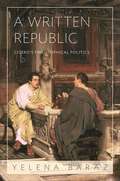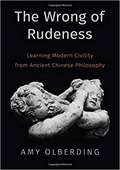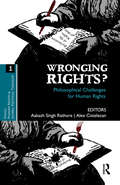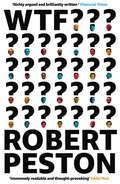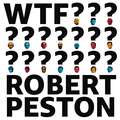- Table View
- List View
Writing Program and Writing Center Collaborations
by Alice Johnston Myatt Lynée Lewis GailletThis book demonstrates how to develop and engage in successful academic collaborations that are both practical and sustainable across campuses and within local communities. Authored by experienced writing program administrators, this edited collection includes a wide range of information addressing collaborative partnerships and projects, theoretical explorations of collaborative praxis, and strategies for sustaining collaborative initiatives. Contributors offer case studies of writing program collaborations and honestly address both the challenges of academic collaboration and the hallmarks of successful partnerships.
Writing Proofs in Analysis
by Jonathan M. KaneThis is a textbook on proof writing in the area of analysis, balancing a survey of the core concepts of mathematical proof with a tight, rigorous examination of the specific tools needed for an understanding of analysis. Instead of the standard "transition" approach to teaching proofs, wherein students are taught fundamentals of logic, given some common proof strategies such as mathematical induction, and presented with a series of well-written proofs to mimic, this textbook teaches what a student needs to be thinking about when trying to construct a proof. Covering the fundamentals of analysis sufficient for a typical beginning Real Analysis course, it never loses sight of the fact that its primary focus is about proof writing skills. This book aims to give the student precise training in the writing of proofs by explaining exactly what elements make up a correct proof, how one goes about constructing an acceptable proof, and, by learning to recognize a correct proof, how to avoid writing incorrect proofs. To this end, all proofs presented in this text are preceded by detailed explanations describing the thought process one goes through when constructing the proof. Over 150 example proofs, templates, and axioms are presented alongside full-color diagrams to elucidate the topics at hand.
Writing Resistance and the Question of Gender: Charlotte Delbo, Noor Inayat Khan, and Germaine Tillion
by Lara R. CurtisThis book presents the first comparative study of the works of Charlotte Delbo, Noor Inayat Khan, and Germaine Tillion in relation to their vigorous struggles against Nazi aggression during World War II and the Holocaust. It illuminates ways in which their early lives conditioned both their political engagements during wartime and their extraordinary literary creations empowered by what Lara R. Curtis refers to as modes of ‘writing resistance.’ With skillful recourse to a remarkable variety of genres, they offer compelling autobiographical reflections, vivid chronicles of wartime atrocities, eyewitness accounts of victims, and acute perspectives on the political implications of major events. Their sensitive reflections of gendered subjectivity authenticate the myriad voices and visions they capture. In sum, this book highlights the lives and works of three courageous women who were ceaselessly committed to a noble cause during the Holocaust and World War II.
Writing the Early Medieval West
by Charles West Elina ScreenFar from the oral society it was once assumed to have been, early medieval Europe was fundamentally shaped by the written word. This book offers a pioneering collection of fresh and innovative studies on a wide range of topics, each one representing cutting-edge scholarship, and collectively setting the field on a new footing. Concentrating on the role of writing in mediating early medieval knowledge of the past, on the importance of surviving manuscripts as clues to the circulation of ideas and political and cultural creativity, and on the role that texts of different kinds played both in supporting and in subverting established power relations, these essays represent a milestone in studies of the early medieval written word.
Writing the Mind: Representing Consciousness from Proust to the Present
by Simon Kemp"My thought is me: that is why I cannot stop. I exist because I think… and I can’t stop myself from thinking." – Jean-Paul Sartre, Nausea Writing the Mind: Representing Consciousness from Proust to Darrieussecq explores the works of seven ground-breaking thinkers and novelists of recent history to compare and contrast the varying representations of the conscious and the unconscious mind. Grounding his study in the writings of philosophers like Jean-Paul Sartre and Marcel Proust, Simon Kemp explores the non-literary influences of science, faith and philosophy as presented in their works, demonstrates how writers learn from and sometimes deviate from preceding generations, and how they agree or disagree with their peers. Kemp’s elegant study also charts the rise and wane of Freudian influence on literature through the twentieth century, and the emergence of cognitive and neo-Darwinian ideas at the dawn of the twenty-first. In the work of these seven writers, we discover radically different understandings of how consciousness and the unconscious mind are constituted, which are the most salient characteristics of mental life, and even what it is that defines a mind at all.
Writing the New World: The Politics of Natural History in the Early Spanish Empire
by Mauro José CaraccioliIn Writing the New World, Mauro Caraccioli examines the natural history writings of early Spanish missionaries, using these texts to argue that colonial Latin America was fundamental in the development of modern political thought. Revealing their narrative context, religious ideals, and political implications, Caraccioli shows how these sixteenth-century works promoted a distinct genre of philosophical wonder in service of an emerging colonial social order.Caraccioli discusses narrative techniques employed by well-known figures such as Gonzalo Fernández de Oviedo and Bartolomé de Las Casas as well as less-studied authors including Bernardino de Sahagún, Francisco Hernández, and José de Acosta. More than mere catalogues of the natural wonders of the New World, these writings advocate mining and molding untapped landscapes, detailing the possibilities for extracting not just resources from the land but also new moral values from indigenous communities. Analyzing the intersections between politics, science, and faith that surface in these accounts, Caraccioli shows how the portrayal of nature served the ends of imperial domination.Integrating the fields of political theory, environmental history, Latin American literature, and religious studies, this book showcases Spain’s role in the intellectual formation of modernity and Latin America’s place as the crucible for the Scientific Revolution. Its insights are also relevant to debates about the interplay between politics and environmental studies in the Global South today. This book is freely available in an open access edition thanks to TOME (Toward an Open Monograph Ecosystem)—a collaboration of the Association of American Universities, the Association of University Presses, and the Association of Research Libraries—and the generous support of Virginia Tech.
Writing the Structures of the Subject
by Will GreenshieldsThis book examines and explores Jacques Lacan's controversial topologisation of psychoanalysis, and seeks to persuade the reader that this enterprise was necessary and important. In providing both an introduction to a fundamental component of Lacan's theories, as well as readings of texts that have been largely ignored, it provides a thorough critical interpretation of his work. Will Greenshields argues that Lacan achieved his most pedagogically clear and successful presentations of his most essential and notoriously complex concepts - such as structure, the subject and the real - through the deployment of topology. The book will help readers to better understand Lacan, and also those concepts that have become prevalent in various intellectual discourses such as contemporary continental philosophy, politics and the study of ideology, and literary or cultural criticism.
Writing the Victorian Constitution (Palgrave Modern Legal History Ser.)
by Ian WardThis book charts the writing of the English constitution through the work of four of the most influential jurists in the history of English constitutional thought—Edmund Burke, Thomas Babington Macaulay, Walter Bagehot and Albert Venn Dicey. Stretching from the French Revolution to the death of Queen Victoria, their writing is both representative of and formative to the Victorian constitution. Ian Ward traces how constitutional writing changed over the course of the long nineteenth century, from the poetics of Burke and the romance of Macaulay, to the pragmatism of Bagehot and the jurisprudence of Dicey. A century on, our perception of the English constitution is still shaped by this contested history.
Writing with Deleuze in the Academy: Creating Monsters
by Stewart Riddle David Bright Eileen HonanIn this book, authors working with Deleuzean theories in educational research in Australia and the United Kingdom grapple with how the academic-writing machine might become less contained and bounded, and instead be used to free impulses to generate different creations and connections. The authors experiment with forms of writing that challenge the boundaries of academic language, moving beyond the strictures of the scientific method that governs and controls what works and what counts to make language vibrate with a new intensity.The authors construct monstrous creations, full of vitality and fervor, hybrid texts, part academic part creative assemblages, almost-but-perhaps-not-quite recognisable as research. Stories that blur the lines between true and untrue, re-presentation and invention.The contributors to this book hope that something might happen in its reading; that some new connections might be made, but also acknowledge the contingency of the encounter between text and reader, and the impossibility of presuming to know what may be.
Writings from the Zen Masters (Penguin Great Ideas)
by VariousThese are unique stories of timeless wisdom and understanding from the Zen Masters. With rich and fascinating tales of swords, tigers, tea, flowers and dogs, the writings of the Masters challenge every perception - and seek to bring all readers closer to enlightenment.Throughout history, some books have changed the world. They have transformed the way we see ourselves - and each other. They have inspired debate, dissent, war and revolution. They have enlightened, outraged, provoked and comforted. They have enriched lives - and destroyed them. Now Penguin brings you the works of the great thinkers, pioneers, radicals and visionaries whose ideas shook civilization and helped make us who we are.
Writings of Charles S. Peirce: 1867-1871
by Charles S. Peirce"For anyone seriously interested in Peirce, or in nineteenth-century American philosophy, or in American intellectual history, or in philosophy in general, or in semiotics and its philosophical import, these volumes should be required reading." —Murray G. Murphey, Semiotica
Writings of Charles S. Peirce: 1890–1892
by Charles S. PeirceVolume 8 of this landmark edition follows Peirce from May 1890 through July 1892—a period of turmoil as his career unraveled at the U.S. Coast and Geodetic Survey. The loss of his principal source of income meant the beginning of permanent penury and a lifelong struggle to find gainful employment. His key achievement during these years is his celebrated Monist metaphysical project, which consists of five classic articles on evolutionary cosmology. Also included are reviews and essays from The Nation in which Peirce critiques Paul Carus, William James, Auguste Comte, Cesare Lombroso, and Karl Pearson, and takes part in a famous dispute between Francis E. Abbot and Josiah Royce. Peirce's short philosophical essays, studies in non-Euclidean geometry and number theory, and his only known experiment in prose fiction complete his production during these years.Peirce's 1883-1909 contributions to the Century Dictionary form the content of volume 7 which is forthcoming.
Writings of Charles S. Peirce: 1872–1878
by Charles S. PeirceThe PEIRCE EDITION contains large sections of previously unpublished material in addition to selected published works. Each volume includes a brief historical and biographical introduction, extensive editorial and textual notes, and a full chronological list of all of Peirce's writings, published and unpublished, during the period covered.
Writings of Charles S. Peirce: 1884-1886
by Charles S. Peirce"Highly recommended." —Choice"... an important event for the world of philosophy. For the first time we have available in an intelligible form the writings of one of the greatest philosophers of the past hundred years." —The Times Literary Supplement <P><P>Volume 5 of this landmark edition covers an important transition in Peirce's life, marked by a rekindled enthusiasm for speculative philosophy. The writings include essays relating to his all-embracing theory of categories as well as papers on logic and mathematics.
Writings of Charles S. Peirce: 1879–1884
by Charles S. Peirce"The volumes are handsomely produced and carefully edited,... For the first time we have available in an intelligible form the writings of one of the greatest philosophers of the past hundred years... " —The Times Literary Supplement"... an extremely handsome and impressive book; it is an equally impressive piece of scholarship and editing." —Man and World
Writings of Charles S. Peirce: 1886-1890
by Charles S. PeirceVolume 6 of this landmark edition contains 66 writings mainly from the unsettled period in Peirce's life just after he moved from New York to Milford, Pennsylvania, followed shortly afterward by the death of his mother. The writings in this volume reveal Peirce's powerful mind probing into diverse issues, looking for an underlying unity, but, perhaps, also looking for direction.
Writings of Charles S. Peirce: Volume I, 1857-1866
by Charles S. PeirceThe PEIRCE EDITION contains large sections of previously unpublished material in addition to selected published works. Each volume includes a brief historical and biographical introduction, extensive editorial and textual notes, and a full chronological list of all of Peirce's writings, published and unpublished, during the period covered.
The Writings of William James
by John J. McdermottA Modern Library collection of writings by the American psychologist, philosopher, and writer William James. His writings touch on themes of psychology, religion, free will, and pragmatism.
Writings on an Ethical Life (Isnm Ser. #Vol. 138)
by Peter SingerThe essential collection of writings by one of the most visionary and daring philosophers of our time Since bursting sensationally into the public consciousness in 1975 with his groundbreaking work Animal Liberation, Peter Singer has remained one of the most provocative ethicists of the modern age. His reputation, built largely on isolated incendiary quotations and outrage-of-the-moment news coverage, has preceded him ever since. Aiming to present a more accurate and thoughtful picture of Singer's pioneering work, Writings on an Ethical Life features twenty-seven excerpts from some of his most lauded and controversial essays and books. The reflections on life, death, murder, vegetarianism, poverty, and ethical living found in these pages come together in a must-read collection for anyone seeking a better understanding of the issues that shape our world today. This ebook features an illustrated biography of Peter Singer, including rare photos from the author's personal collection.
Writings on Subaltern Practice
by Ahmar MahboobSubaltern theory emerged as a small voice within academia decades ago. Over time, this work generated significant debate and numerous publications, talks, and conferences. However, little has changed in the experienced lives of the masses. This led people to wonder: “the subalterns seem to have a voice, but can they take action?”; or, in other words, is there subaltern practice?This collection of essays and poems, written with a broad audience in mind, hopes to demonstrate not just how the subaltern can identify and question hegemonic practices, but how they can create alternative frameworks and material that enable themselves and their communities. In doing so, this book aims to demonstrate not just how deep the colonial poisons run, but also how to detoxify ourselves and the environment around us.The writings included in this book study the inequalities that we experience in and around us and suggest actions and practices that can help us regain harmony. It is a call for action and a sharing of ideas that can enable us to regain balance and fulfil our human responsibilities.
A Written Republic: Cicero's Philosophical Politics
by Yelena BarazIn the 40s BCE, during his forced retirement from politics under Caesar's dictatorship, Cicero turned to philosophy, producing a massive and important body of work. As he was acutely aware, this was an unusual undertaking for a Roman statesman because Romans were often hostile to philosophy, perceiving it as foreign and incompatible with fulfilling one's duty as a citizen. How, then, are we to understand Cicero's decision to pursue philosophy in the context of the political, intellectual, and cultural life of the late Roman republic? In A Written Republic, Yelena Baraz takes up this question and makes the case that philosophy for Cicero was not a retreat from politics but a continuation of politics by other means, an alternative way of living a political life and serving the state under newly restricted conditions. Baraz examines the rhetorical battle that Cicero stages in his philosophical prefaces--a battle between the forces that would oppose or support his project. He presents his philosophy as intimately connected to the new political circumstances and his exclusion from politics. His goal--to benefit the state by providing new moral resources for the Roman elite--was traditional, even if his method of translating Greek philosophical knowledge into Latin and combining Greek sources with Roman heritage was unorthodox. A Written Republic provides a new perspective on Cicero's conception of his philosophical project while also adding to the broader picture of late-Roman political, intellectual, and cultural life.
The Wrong of Rudeness: Learning Modern Civility from Ancient Chinese Philosophy
by Amy OlberdingIn a time of fractious politics, being rude can feel wickedly gratifying, while being polite can feel simple-minded or willfully naïve. Do manners and civility even matter now? Is it worthwhile to make the effort to be polite? When rudeness has become routine and commonplace, why bother? When so much of public and social life with others is painful and bitterly acrimonious, why should anyone be polite? <p><p> As Amy Olberding argues, civility and ordinary politeness are linked both to big values, such as respect and consideration, and to the fundamentally social nature of human beings. Being polite is not just a nicety--it has deep meaning. Olberding explores the often overwhelming temptations to incivility and rudeness, and the ways that they must and can be resisted. <p><p> Drawing on the wisdom of early Chinese philosophers who lived through great political turmoil but nonetheless avidly sought to "mind their manners," the book articulates a way of thinking about politeness that is distinctively social. We can feel profoundly alienated from others, and others can sometimes be truly terrible, yet, as the Confucian philosophers encourage us to see, because we are social, neglecting the social and political courtesies comes at perilous cost. <p><p> The book considers not simply why civility and politeness are important, but how. It reveals how small insults can accumulate to damage social relations, how separating people into tribes undermines our better interests, and how even bodily and facial expressions can influence our lives with others. Many of us, in spite of our best efforts, are often tempted to be rude, and will find here tools for fighting that temptation.
Wronging Rights?: Philosophical Challenges for Human Rights (Ethics, Human Rights and Global Political Thought)
by Aakash Singh Rathore Alex CistelecanThis book brings together two of the most powerful and relevant philosophical critiques of human rights: the post-colonialist and the post-Althusserian, its balanced internal structure not just throwing these two critiques together, but actually forcing them to enter into confrontation and dialogue. The book is organised in three parts: at each end, the post-colonialist and the post-Althusserian critiques are represented by some of their main thinkers (Ratna Kapur, G. C. Spivak, Upendra Baxi; Slavoj Žižek, Jacques Rancière), while in the middle, an American intermezzo (Richard Rorty, Wendy Brown) functions as a genuine Derridian supplement: always already contaminating the purity of the two theoretical schools, preventing their enclosure and, hence, fuelling and complicating further their mutual confrontation. As in any authentic dialogue, the introduction and the conclusion each claim victory for one of the sides by changing the very terms and rules of the dialogue, picturing it as a confrontation between emancipatory universalism and inefficient particularism (from the perspective of the post-Althusserians), or as a split between hypocrisy and truth (from the perspective of the post-colonialists).
WTF?: A Times top 10 bestseller
by Robert PestonTHE TOP 10 BESTSELLER'Richly argued and brilliantly written... a deeply thoughtful analysis that should be mandatory reading for anyone seeking to understand where we have gone wrong.' Vernon Bogdanor, Financial TimesIn WTF? Robert Peston draws on his years of experience as a political, economics and business journalist to show us what has gone bad and gives us a manifesto to put at least some of it right. Framed by two letters to his father (who died in early 2016) WTF? is Robert Peston's highly personal account of what those who have ruled us for years got so badly wrong, and what we need to do to mend the terrible fractures in our society.With characteristic passion and clarity he looks at what must happen to prevent democracy being subverted by technocratic geniuses with the ability to manipulate social media, how and whether it is possible to make a success of leaving the EU, what the lessons should be of the appalling Grenfell Tower tragedy, whether robots can be stopped from taking our work, what can be done to staunch the widening gap between rich and poor, and how to raise living standards for all.WTF? is a trenchant, often entertaining account of the recent past. It is also a call to action, giving hope to all of us who believe that taking back control is not only vital, but possible.'A manual for our times that everyone should read.' Matthew d'Ancona
WTF?: A Times top 10 bestseller
by Robert PestonTHE TOP 10 BESTSELLER 'Richly argued and brilliantly written... a deeply thoughtful analysis that should be mandatory reading for anyone seeking to understand where we have gone wrong.' Vernon Bogdanor, Financial Times In WTF? Robert Peston draws on his years of experience as a political, economics and business journalist to show us what has gone bad and gives us a manifesto to put at least some of it right. Framed by two letters to his father (who died in early 2016) WTF? is Robert Peston's highly personal account of what those who have ruled us for years got so badly wrong, and what we need to do to mend the terrible fractures in our society. With characteristic passion and clarity he looks at what must happen to prevent democracy being subverted by technocratic geniuses with the ability to manipulate social media, how and whether it is possible to make a success of leaving the EU, what the lessons should be of the appalling Grenfell Tower tragedy, whether robots can be stopped from taking our work, what can be done to staunch the widening gap between rich and poor, and how to raise living standards for all. WTF? is a trenchant, often entertaining account of the recent past. It is also a call to action, giving hope to all of us who believe that taking back control is not only vital, but possible. 'A manual for our times that everyone should read.' Matthew d'Ancona
